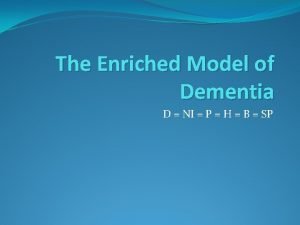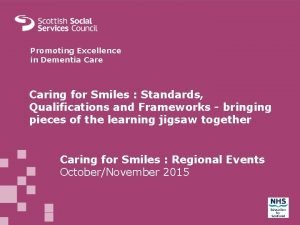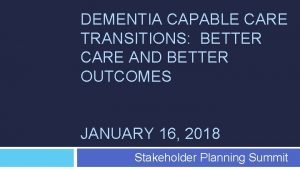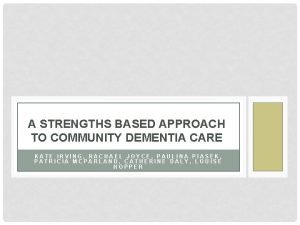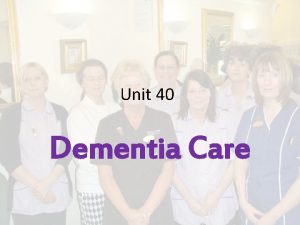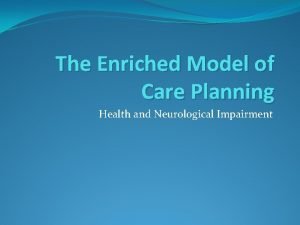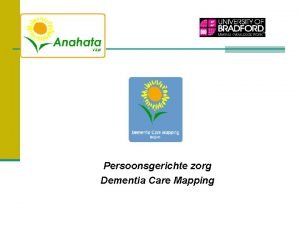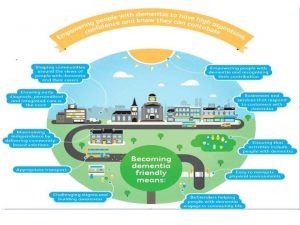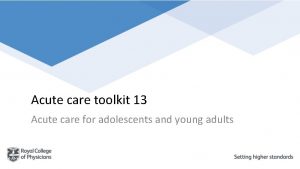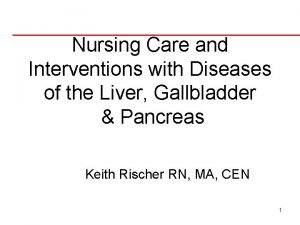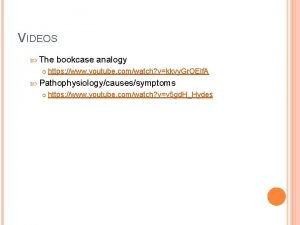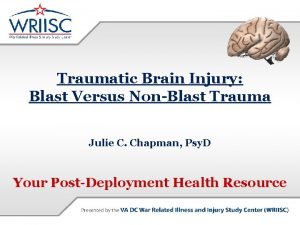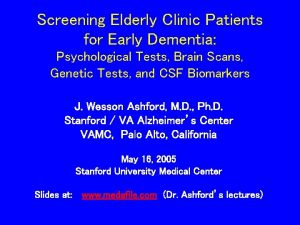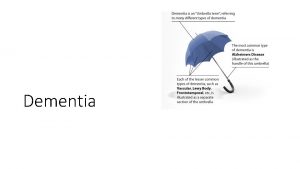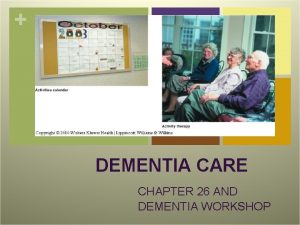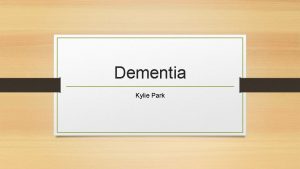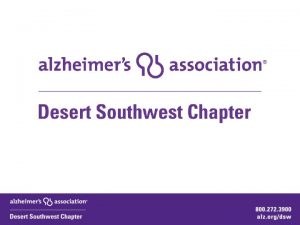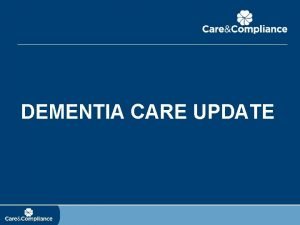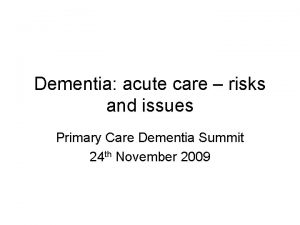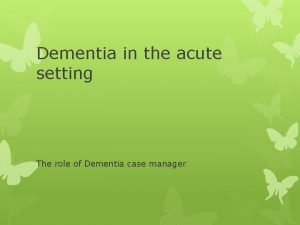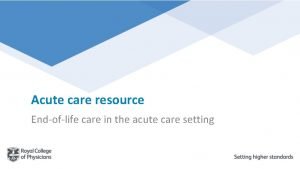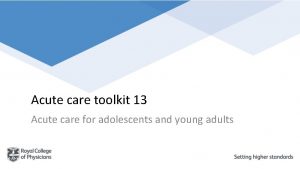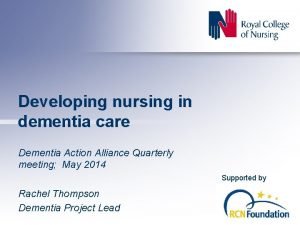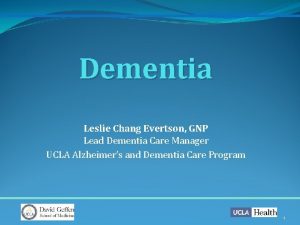Dementia in the acute care setting The CLAHRC















- Slides: 15

Dementia in the acute care setting The CLAHRC CP & De. NDRo. N meeting Sept 2011 Dr Claire G Nicholl Consultant geriatrician, Addenbrookes

Declaration of interests • Honoraria for lectures (Shire and Novartis) • Sponsorship to attend the International Psychogeriatric Association 2007 meeting (Shire) and British Geriatrics Society meeting 2010.

What will be covered? In-patients (frail older people) Delirium, usually on background of dementia Organisation – Dementia Strategy Group Results from the National Audit of Dementia Specific projects: delirium unit, SHAPED, HIEC funding • Overlap areas: management of vulnerable adults, pain management, falls prevention, feeding issues • • •

Acute care pathway • Patient arrives in ED RECOGNITION & ASSESSMENT 4 hours • Destination ward MULTIDISCIPLINARY MANAGEMENT & CARE • Leaves hospital DISCHARGE PLANNING Arrows show ideal patient flow in hospital

Acute care pathway • Patient arrives in ED RECOGNITION & ASSESSMENT • Destination ward MULTIDISCIPLINARY CARE • Leave hospital DISCHARGE PLANNING Additional arrows show major information flows that need optimising H I E C

Why is it hard to get basic information in dementia? • Dementia / previous delirium not recognised or omitted from admission information • Lack of detail from patient • Something plausible • Lack of detail from carer – distant or care setting • Problem not apparent routine disrupted acute presentation • Whether the person with dementia presents depends on the interaction brain environment (maze)

National Audit of Dementia 2010 Core audit (206/238 sites) • Hospital organisational checklist (governance, care, mental health needs, discharge policy, information, recognition, training, resources, liaison psychiatry) • Retrospective case-note audit (n=40) 61 -98 years, mean 82 (83) 75% from care of the elderly (44%) 2. 5% from general medicine (33%) Median Lo. S 17 days (15) ie a huge challenge ahead!

Acute care pathway • Patient arrives in ED • Destination ward RECOGNITION & ASSESSMENT MULTIDISCIPLINARY CARE Delirium unit • Leave hospital DISCHARGE PLANNING SHAPED pilot H I E C £

Recognition - cognitive tests length sensitivity • AMT • Mini Mental State Examination (MMSE) • Way forward? – Has Mrs Smith become more confused in the last year? – Has Mrs Smith become more confused in the last few days? – Are you / do you think Mrs Smith is depressed? • What are we testing? • What does the result mean?

MMSE of 24/30 • • • Education Dementia Delirium Depression Deafness Poor vision English as a second language Dysphasia Limited cooperation

Addenbrooke’s initiatives Delirium unit • thanks to Duncan Forsyth and his team • Images showing use of colour to identify bays, clear signage using pictures and words visible from the bedside, red toilet seats, ‘café seating area, appropriate paintings etc – (see information from University of Stirling about design for dementia) • Role of education for staff and carers • Role of activities SHAPED • see afternoon session (Gareth Peters and Clare Wai) • Supported home assessment for people with dementia • Scheme to allow elderly patients with dementia and delirium in hospital for whom discharge is considered ‘risky’ the opportunity to return home with live-in care for a 2 week period to see if their confusion decreases on discharge to a familiar environment. HIEC funding for improved education about dementia for all grades of hospital staff

Is the dementia the main problem? diseases ageing physiology fitness social factors

Management

What gets overlooked in dementia? Huge individual variation, stage and support • General health: eyes, ears, feet • Mood • Other drugs • The need to check – examine / tests • The carer • The plot

Feeding issues • All frail older people in hospital need support to maintain hydration and nutrition (appropriate food, well cooked and served, in reach, appropriate utensils, help to eat and drink, encouragement to continue etc) – skill, time and resources • People with dementia who are nearing the end of their life stop eating and drinking enough to meet their needs – education for carers, staff at all levels, evidence base, emotional support, feeding issues MDT. Tube feeding is rarely appropriate, nor is ‘nil-by-mouth’; comfort feeding is usually the aim. Mitchell SL. N Engl J Med 2009; 361: 1529 -38. Sampson EL. Cochrane Database Syst Rev 2009; 2: CD 007209.
 Enriched model of care social psychology
Enriched model of care social psychology Tom kitwood enriched model of dementia care
Tom kitwood enriched model of dementia care Promoting excellence in dementia care
Promoting excellence in dementia care Dementia capable care
Dementia capable care Crescare
Crescare Unit 40 health and social care
Unit 40 health and social care Enriched model of dementia care
Enriched model of dementia care Dementia care mapping checklist
Dementia care mapping checklist Dementia care bath
Dementia care bath Primary secondary tertiary medical care
Primary secondary tertiary medical care Acute care collaboration
Acute care collaboration Rcp acute care toolkit
Rcp acute care toolkit Hepatitis a incubation period
Hepatitis a incubation period Bookcase analogy dementia
Bookcase analogy dementia Dementia pugilistica
Dementia pugilistica Latragenic
Latragenic
